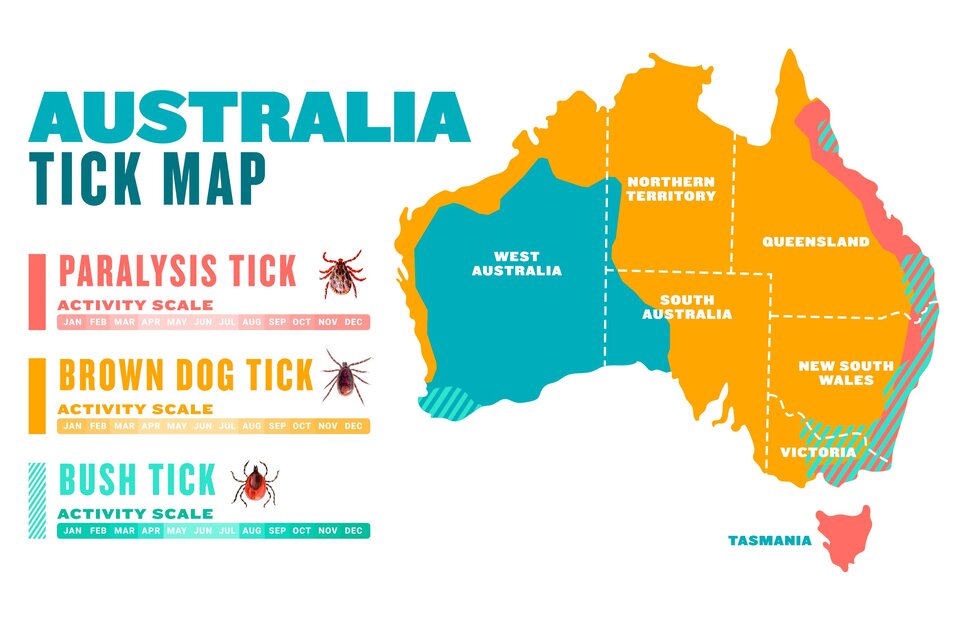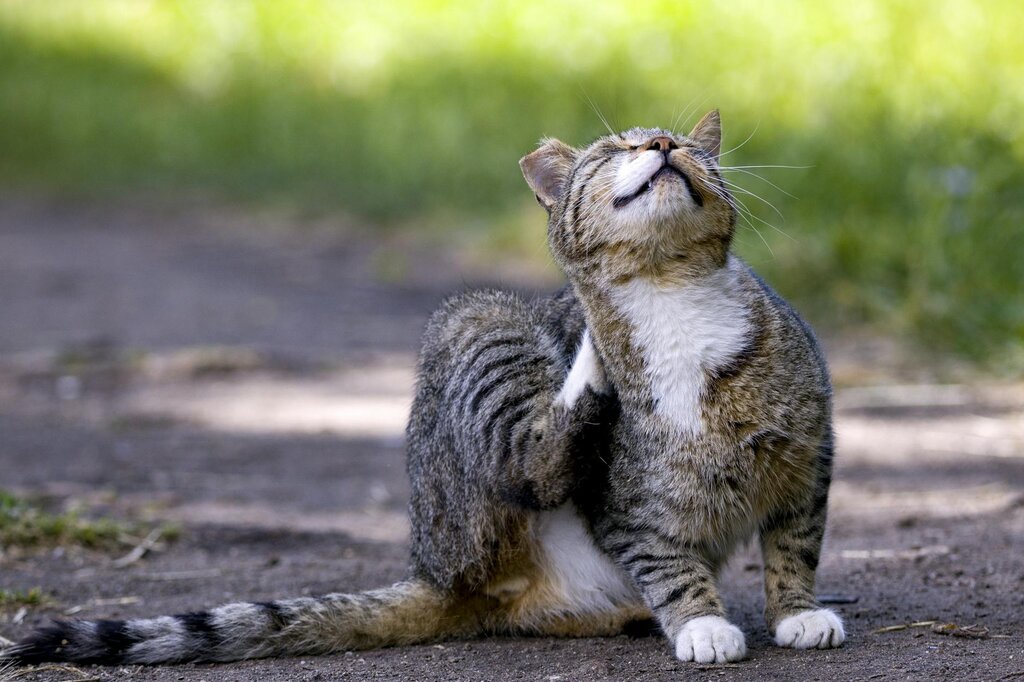Last Updated: 19/10/2025
Spring Pet Care Tips
Tips for keeping your pet fit, healthy, itch and parasite free, all Spring long!
Author: Dr Teagan Lever BVSc (Hons)
Reading Time: 6 minutes - short read
Wouldn't you know it - the frost has thawed and sunny Spring is here! All across Australia we see flowers a-blooming, birds a-chirpin', and days a-warming. It's the perfect season for frolicking outdoors with your four-legged friends.
But it's important to remember that fleas and other nasties are at their worst this season, and fresh new grass and pollinating plants can irritate sensitive skin. Read our tips for keeping your pet healthy, happy and safe this Spring!
In this article
Which springtime parasites pose a risk to your pet?
Ticks: Very high risk.
There are 3 species of ticks in Australia: The Paralysis Tick, The Brown Dog Tick, and the Bush Tick.
Only the Paralysis Tick is venomous. Paralysis Ticks - are one of the most important Australian parasites due to their abundancy along the heavily populated Eastern coastline, and the deadly paralysis condition they create.
Ticks are at their worst during Spring and Summer due to their breeding season. This seasonal 'tick explosion' can vary each year, and can begin as early as late July. To check whether ticks are presenting a risk early this year in your area, ask your local vet clinic.

Fleas: High risk
Fleas love the warm weather and breed most actively during Spring. Fleas can be very difficult to see in your pet's fur - in fact, most people will never see them. You may instead spot 'flea dirt' (which is actually flea faeces!) within the fur over your dog's rump or under your cat's chin. Make sure to keep your pet protected all Spring long with a reputable flea preventative like Nexgard Spectra, Bravecto, or Revolution Plus.
Learn more about fleas and their life cycle.
Heartworm: Moderate-high risk
The transmission of heartworm is at its worst in Summer due to its mosquito-borne method of spread, however mozzies can certainly start to ramp up in Spring - so it's vital to be on top of your pet's heartworm prevention. Plus, with such a slow life cycle, pets requires consistent treatment with no breaks, in order to protect against any immature larvae and keep their bodies heartworm-free!
Learn more about heartworm and the best prevention for dogs.
Mites: Moderate-low risk
Dust mites tend to flare up in Winter when our windows are closed and homes are stuffy, however some species such as Demodex or ear mites may pose a risk all year round.
Learn more about the different species of mites.
Which preventatives are best for spring?
If your pet lives in a tick area, then prevention year round is recommended, but is especially important during Spring.
However, some animals may not require tick prevention. In many parts of Australia (particularly West Australia and South Australia), tick prevention may not be necessary due to its distribution along the Eastern side of the country.
All-in-One or Combination products are a great option as they protect your pet against most of the common Australian parasites, all in one easy product. Recommended brands include Nexgard Spectra and Simparica Trio for dogs and Nexgard Spectra, Revolution Plus and Bravecto Plus for cats.
Want to know more?Read our articles Flea, Tick and Worming Guide For Dogs or the Flea, Tick and Worming Guide For Cats.
Vet recommended preventatives for dogs and cats
Springtime allergies

Spring brings a lot of new plant growth. Flowering and non-flowering plants, grasses, pollens, and weeds can all cause your pet to itch, scratch, and develop a range of skin conditions. As the weather becomes warmer and your pet spends more time outdoors exploring their environment, they may react to new plants and pollens in the air.
Common Signs of Springtime Allergies:
- Excessive scratching
- Red and irritated skin
- Licking and chewing paws
- Ear infections
'Atopy' is the general term used to describe an allergy to things in the environment like pollen, dustmites, grasses, etc. Some dogs with atopy might only be allergic to one or two things, but others might be allergic to literally dozens of allergens. This is similar to humans - ever noticed how some people who are allergic to cats are often also allergic to dust and pollen too?
Unfortunately, unlike changing your pet's diet or keeping flea control up to date, avoiding pollen and grass is not a feasible task. Unless your pet is kept in a quarantine zone, pollen and dust exposure is inevitable.
Pets with atopic dermatitis can have intradermal skin testing with a veterinary dermatologist to identify the cause of their allergies. This is usually followed by a course of immunisations to desensitise the pet against the cause of the allergy, helping to control symptoms. If intradermal testing and desensitisation are not effective or available, other medications and methods can be used to try and minimise the side effects, or strengthen the skin barrier.
Spring Skin Care Tips
Because it can be difficult (if not impossible!) to reduce your pet's exposure to springtime grass and pollen, your best defence may be to improve the strength of your pet's skin barrier. Stronger, healthier skin means that your pet has a tougher physical barrier to the causative allergen, and also reduces the inflammatory response. This can be achieved by implementing a few easy changes at home.
1. Provide beneficial oils into the diet
Help nourish the skin from the inside out with the addition of Omega Fatty Acids which strengthen the skin layer while soothing dry, itchy skin. This can be achieved by feeding a skin care or a fish-based food, or with the addition of an Omega fatty acid supplement .
2. Soothing shampoo, conditioner or lotion
Some shampoos can provide relief from inflammation or help heal infection. Oatmeal based shampoos are ideal for sensitive pets who suffer from dermatitis by providing gentle cleansing to remove dirt, chemicals and allergens from the skin. Use together with a conditioner to prolong the soothing effect and restore moisture to the skin.High-quality soothing lotions contain beneficial moisturising properties to help nourish inflamed skin. They can also help provide an extra 'barrier' layer on the skin surface, reducing the risk of some allergens penetrating through and causing a reaction.
Top recommended skin care products
Spring fitness tips

This Spring, take advantage of the sunshine and get active with your best friend. Just like for humans, exercise helps your dog burn off some extra calories and kick-starts their metabolism. Why not shed that winter weight together?
If you need some extra inspiration, why not splash out on some fun new walking accessories? Just as a new set of active wear can encourage you to hit the gym, a fab new walking accessory may be the 'dog walk inspiration' you need.
For cats, keep them active by encouraging them to play regularly. Provide your kitty with plenty of toys, and don't forget to rotate through them as cats can get bored with the same toys after a while.
Articles recommended for you
Our vet authored guide to the benefits of feeding your dog fresh food plus tips and advice for introducing it into their regular menu.
See our guide to protecting your pet from parasites from our vet team.
Thinking of getting a fish? Check out our guide for setting up a tank and home care tips!
Looking to understand horse feeds better? This comprehensive guide covers feeding recommendations for horses of all ages and disciplines.
Does your pet suffer from anxiety? Check out our Vet-guide for treatment options to help your pet.
History
Our experts continually monitor the health and wellness space and we update our articles when new information becomes available.
Mon Oct 20 2025
Edited by Dr Belinda Stancombe BVSc (Hons)Dr Teagan Lever BVSc (Hons)
Head Veterinarian, BVSc (Hons)
Pet Circle's Head Veterinarian, Dr Teagan graduated from the University of Queensland in 2010 and went on to work in small animal and mixed practice in various locations around QLD & ACT before joining Pet Circle in early 2016. Dr Teagan has special interests in dermatology, nutrition and preventative health care. She feels privileged to witness the special bond people share with their pets on a daily basis and enjoys forming lasting relationships with pet parents and their fur children.

